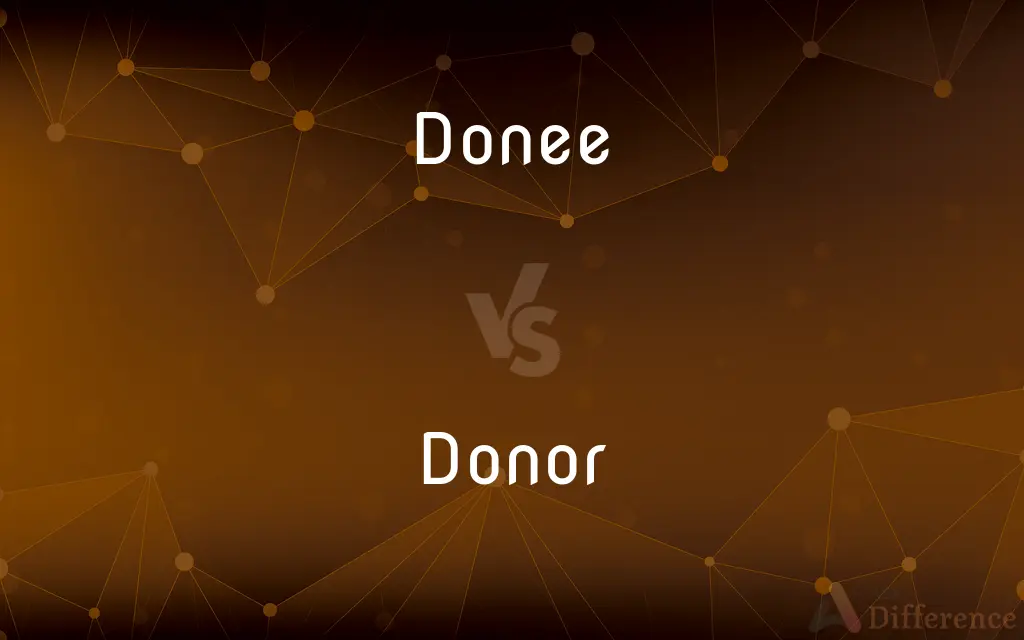Donee vs. Donor — What's the Difference?
Edited by Tayyaba Rehman — By Maham Liaqat — Updated on March 3, 2024
Donee receives a gift or donation, whereas donor gives it.

Difference Between Donee and Donor
Table of Contents
ADVERTISEMENT
Key Differences
A donor is an individual or organization that gives something, often money or goods, without expecting anything in return. This act of giving can be motivated by charity, altruism, or for tax benefits. Whereas a donee is the recipient of this generosity, receiving the gift or donation for personal, charitable, or organizational benefit.
The relationship between a donor and donee is fundamental to various sectors, including non-profits, education, and healthcare. Donors often contribute with the intention of supporting a cause, project, or individual, while donees benefit from this support to achieve their goals or meet their needs.
The distinction is crucial in the context of gifts and charitable donations. The donor must have the intent to give, and the donee must accept the gift for the transfer to be considered valid. This ensures that the transaction is consensual and meets all necessary legal requirements.
Tax implications for the donor and donee can vary significantly depending on the jurisdiction and the nature of the gift. Donors may receive tax deductions for their contributions, while donees, especially if they are part of a non-profit organization, can benefit from receiving funds or goods without tax liabilities.
The process of donation can be formal or informal, ranging from a written agreement for large charitable donations to a simple act of giving personal property to another individual. Regardless of the formality, the roles of donor and donee remain distinct and essential to the act of giving.
ADVERTISEMENT
Comparison Chart
Definition
An individual or entity that gives something without expecting anything in return.
The recipient of a gift or donation.
Role in Transaction
Initiates the giving process.
Receives the benefit of the donation.
Motivation
Altruism, charity, tax benefits.
Personal, organizational, or charitable benefit.
Legal Aspect
Must have the intent to give and follow legal requirements for donations.
Must accept the gift or donation for the transaction to be valid.
Tax Implications
May receive tax deductions for charitable contributions.
Receives funds or goods, potentially without tax liabilities if part of a non-profit.
Compare with Definitions
Donee
Can be an individual, charity, or organization.
The scholarship fund served as a donee, providing financial aid to students.
Donor
An entity that donates goods, money, or services to a person or organization.
The donor contributed a significant sum to the charity.
Donee
Involved in legal transactions to receive gifts.
The family was the donee in a deed of gift for the ancestral home.
Donor
Must intend to make the donation without expecting return.
The art collector, as a donor, gifted several pieces to the museum.
Donee
Benefits from the generosity of donors.
As a donee, the school received new computers for its technology lab.
Donor
Acts out of charity, altruism, or to gain tax benefits.
As a donor, she enjoyed the benefit of a tax deduction for her contribution.
Donee
Accepts donations to fulfill a need or support a cause.
The donee accepted the donation with gratitude, recognizing its impact on their project.
Donor
Engages in philanthropy or charitable giving.
The foundation acted as a major donor to several non-profit organizations.
Donee
The recipient of a donation or gift.
The local food bank was the donee of the supermarket's surplus produce.
Donor
Can be an individual, corporation, or foundation.
Corporate donors played a key role in the fundraising event.
Donee
The recipient of a gift.
Donor
A donor in general is a person, organization or government which donates something voluntarily. The term is usually used to represent a form of pure altruism, but is sometimes used when the payment for a service is recognized by all parties as representing less than the value of the donation and that the motivation is altruistic.
Donee
Someone who receives a gift from a donor.
John became the donee of the bone marrow donated by his brother.
Donor
A person who donates something, especially money to charity
An anonymous donor has given £25
Loans from rich donor countries
Donee
The person to whom a gift or donation is made.
Donor
One that contributes something, such as money, to a cause or fund.
Donor
One who makes a donation.
The charity raised $2,000 from various donors.
The hospital is seeking an organ donor.
Donor
One who gives or bestows; one who confers anything gratuitously; a benefactor. Inverse of recipient.
Donor
One who grants an estate; in later use, one who confers a power; - the opposite of donee.
Touching, the parties unto deeds and charters, we are to consider as well the donors and granters as the donees or grantees.
Donor
Person who makes a gift of property
Common Curiosities
Are donations always monetary?
No, donations can include money, goods, services, or even time, depending on the donor's capability and the donee's needs.
Can a donee also be a donor?
Yes, an individual or organization can both receive and give donations, acting as a donee in one instance and a donor in another.
How can donees ensure they are receiving donations ethically?
Donees should conduct due diligence on the sources of donations to ensure they align with their ethical standards and legal requirements.
Can a donation be made anonymously?
Yes, donors can choose to remain anonymous, respecting their privacy while still contributing to a cause or individual.
Is there a legal difference between a gift and a donation?
The terms are often used interchangeably, but in legal contexts, a donation typically refers to contributions to charitable organizations, while a gift may be more personal.
Can a donation be conditional?
Yes, donors can specify conditions for their donations, such as how it's to be used, which must be agreed upon by the donee.
Do donors always receive tax benefits?
While many donations qualify for tax deductions, it depends on the jurisdiction and the nature of the donation. Donors should consult tax professionals.
How do international donations work?
International donations may involve additional legal and tax considerations, including compliance with both the donor's and donee's country laws.
Are there limitations on who can be a donee?
While individuals and organizations can generally receive donations, tax-exempt status and other benefits are typically reserved for qualified non-profits and charities.
How do donees report donations?
Donees, especially non-profits, must adhere to reporting requirements for donations, which can vary by jurisdiction and organization type.
What protections exist for donors?
Legal frameworks ensure that donations are used as intended and provide donors with rights regarding tax deductions and recognition.
Can donations be revoked?
Once a donation is made and accepted, it generally cannot be revoked unless conditions attached to the donation are not met.
What is the importance of donor-donee relationships?
Strong relationships encourage ongoing support, transparency, and impact, benefiting both the donor's intent and the donee's mission.
How do I become a donor?
Anyone can become a donor by choosing to give to individuals, organizations, or causes they wish to support, following any legal or organizational guidelines.
How are donations recognized?
Donations can be recognized through acknowledgments, tax receipts, or public recognition, depending on the donor's wishes and the donee's policies.
Share Your Discovery

Previous Comparison
Vomit vs. Barf
Next Comparison
Medallist vs. MedalistAuthor Spotlight
Written by
Maham LiaqatEdited by
Tayyaba RehmanTayyaba Rehman is a distinguished writer, currently serving as a primary contributor to askdifference.com. As a researcher in semantics and etymology, Tayyaba's passion for the complexity of languages and their distinctions has found a perfect home on the platform. Tayyaba delves into the intricacies of language, distinguishing between commonly confused words and phrases, thereby providing clarity for readers worldwide.















































